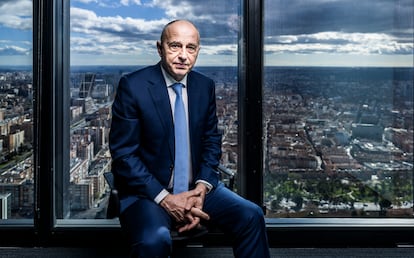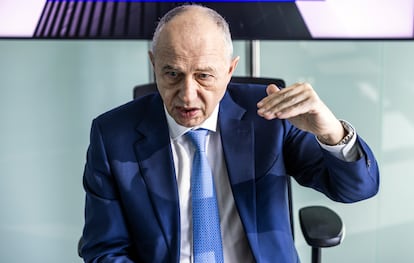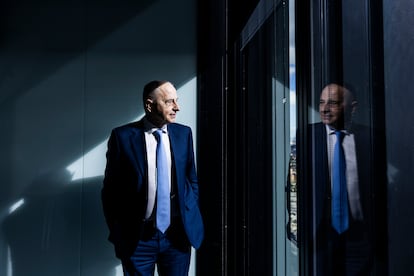NATO’s number two official: ‘Putin’s nuclear threat is in the logic of psychological intimidation rather than in real intentions’
Mircea Geoană, deputy secretary general of the North Atlantic Alliance, notes that the US needs its European allies as much as Europe needs America

As deputy secretary general of NATO, Mircea Geoană has spent the last four and a half years monitoring the growing threats from Vladimir Putin’s Russia. Shortly before this interview was held, the head of the Kremlin launched his most explicit nuclear threat since the beginning of the invasion of Ukraine in February 2022. The social democratic politician’s response to Moscow’s rhetoric is calm but firm. His own arguments revolve around a forceful idea: that the members of the North Atlantic Alliance have done a lot to help the invaded country and must continue to do so. But above all, that they must not fall into despair in the face of difficulties.
During a half-hour meeting at the Madrid headquarters of IE University, Geoană, 65, summarized the various challenges that Western societies face in an era that he defines as one of “renewed great power competition.” In response to Donald Trump’s attacks on NATO’s guiding principle — mutual protection among allies — he replies that the United States needs Europe as much as the latter needs the former.
Question. Putin spoke this Thursday of a nuclear attack that would entail the “destruction of our civilization.” How seriously do you take his words?
Answer. We have seen such use of nuclear threats from Russian leaders for at least two years, since the war in Ukraine started. And this, from a nuclear superpower like Russia. This is highly irresponsible because when you possess such weapons, you also have an obligation for restraint. It is part of their arsenal of psychological pressure intimidation.
Q. Do you then view it more as a bluff than a real threat?
A. It is a speech that is in the logic of psychological intimidation rather than in real intentions. We don’t see any imminent threat of Russia using such weapons. But such statements are very dangerous because they erode trust in the field of nuclear weapons. Russia knows the consequences of such an eventuality. We know that this is mainly the same bombastic way of blasting the West and describing the war that he started in Ukraine as a war of civilizations or when he maintains that the West is trying to destroy Russia, which is total nonsense.
Q. Putin was responding to statements by French President Emmanuel Macron, who did not rule out any option, including sending troops to Ukraine, something that other European and U.S. leaders have ruled out. NATO Secretary General Jens Stoltenberg himself said that no such plans exist. Is it an error to talk about measures that are discarded a few hours later?
A. We fully respect the right of nations and leaders to come up with fresh ideas. But at NATO we have no intention and no plans to deploy troops in Ukraine. What we are determined to do is continue to support Ukraine and avoid escalation with Russia, something we have done satisfactorily so far. This is especially important after Ukraine started negotiations for accession to the EU and is moving closer to NATO. We cannot say when, but one day independent sovereign Ukraine will be part of both NATO and the EU. This war is likely to continue for some time. So NATO will continue to ensure that we support Ukraine and avoid escalation with Russia.
Q. Moscow has recently achieved military successes such as the capture of Avdiivka. Meanwhile U.S. aid to Ukraine is paralyzed, the collapse of the Russian economy that many predicted has not occurred... Is Putin winning the war?
A. We have to avoid the temptation to be too optimistic, as we were a few months before the counteroffensive, or too pessimistic, as we seem to be today. This war is very dynamic. If I look at the glass half full, I see Ukraine pushing the Russian fleet from the Black Sea, away from Crimea towards the Sea of Azov. That’s a huge success. I see Ukraine with our help restoring the Black Sea export route for Ukrainian grains to Africa and to the rest of the Middle East. I see some technical difficulties for Ukraine, but no strategic difficulties. So let’s have confidence that as Russia has switched into a war economy, and receives support from North Korea and Iran, that we also ramp up our production, our industrial base, to help Ukraine but also to refill our own needs for our own security and defense and deterrence in Europe.

Q. Trump, who has encouraged Russia to do “whatever the hell it wants” to any NATO country that does not spend enough on defense, is virtually guaranteed the Republican nomination for the November election. Would a new Trump administration pose a threat to the commitment on which the Alliance was created?
A. We saw very powerful statements from President Trump at the beginning of his term, but then he worked with NATO. He understood the need for this alliance, and the interest of America to keep this alliance strong, progressively changing his views and expressing far more constructive approaches when it comes to NATO. I cannot prejudge who the American people will elect. But polls show immense support for NATO in the public opinion of America. In a recent YouGov survey, more than 60% of the population was willing to defend their allies. Both Republicans and Democrats understand very well the very complicated competition with China, Russia, Iran and North Korea. The United States will need all its allies in Europe and the rest of the world. China will never have so many allies. And this is why NATO is precious for us in Europe, but also very important for America. Let us ensure that we do not erode confidence in the sanctity of NATO Article 5. We need each other more than ever. Staying together serves the interests of both sides of the Atlantic.
Q. How should allies prepare for a hypothetical return of Trump to the White House? Has the time come to accept that the U.S. no longer guarantees European security?
A. This has been a recurring conversation for more than 20 years. In NATO, EU states are contributing only 20% of the total defense expenditure. So 27 member states together, that’s only 20%. I’m a strong supporter of the European Union project, but I believe that in a way, it’s counterproductive to have this Cassandra prophecy of things that will not happen. America needs us. And we need America. We all need each other. The EU is relatively weak in defense due to a lack of investment for decades, but also due to the fragmentation of the defense market. NATO is the EU’s best partner to avoid its fragmentation.
Q. Germany refuses to send Taurus missiles to Ukraine. Earlier, there was discussion about the Leopards and the F-16 jets, steps that were finally taken. Is this gradual strategy of taking small steps responsible for Russia’s current advances?
A. I have to respect the democratic decisions of each country. These are especially complicated steps in Germany, a country that after a long period of pacifism is, however, doing a lot: it dedicates 2% of GDP to defense and helps Ukraine with significant resources. Before, the F-16s were a kind of taboo. Now we are ready to train the first Ukrainian pilots. Let's give democracies time to make decisions before rushing and criticizing. The same goes for the United States Congress.
Q. The president of the European Commission, Ursula von der Leyen, has warned that “the threat of war may not be imminent, but it is not impossible.” Are allies doing enough in the face of this danger?
A. The EU is adjusting to a new reality since the illegal annexation of Crimea in 2014. Then, countries began to invest more in defense. Last year, at the NATO summit in Madrid, we adopted the most important deterrence and defense plans since the end of the Cold War. Nations are doing a great job for this Alliance. They are providing a lot.
Q. Should NATO thank Putin for the accession of new members such as Finland and soon Sweden?
A. Putin has made a series of strategic misjudgments: he misjudged the resistance of the Ukrainian people and believed that NATO would return to the pre-1997 borders. We now have among our members two countries that had been neutral, in the Swedish case for more than 200 years. And now NATO has an Eastern flank which covers the North Sea, the Baltic Sea, the Black Sea and Mediterranean Sea. This is a huge strategic difficulty for Putin. He believed that the West would be weak and divided, but we are strong and united.

Sign up for our weekly newsletter to get more English-language news coverage from EL PAÍS USA Edition
Tu suscripción se está usando en otro dispositivo
¿Quieres añadir otro usuario a tu suscripción?
Si continúas leyendo en este dispositivo, no se podrá leer en el otro.
FlechaTu suscripción se está usando en otro dispositivo y solo puedes acceder a EL PAÍS desde un dispositivo a la vez.
Si quieres compartir tu cuenta, cambia tu suscripción a la modalidad Premium, así podrás añadir otro usuario. Cada uno accederá con su propia cuenta de email, lo que os permitirá personalizar vuestra experiencia en EL PAÍS.
¿Tienes una suscripción de empresa? Accede aquí para contratar más cuentas.
En el caso de no saber quién está usando tu cuenta, te recomendamos cambiar tu contraseña aquí.
Si decides continuar compartiendo tu cuenta, este mensaje se mostrará en tu dispositivo y en el de la otra persona que está usando tu cuenta de forma indefinida, afectando a tu experiencia de lectura. Puedes consultar aquí los términos y condiciones de la suscripción digital.









































